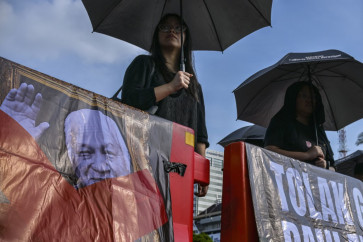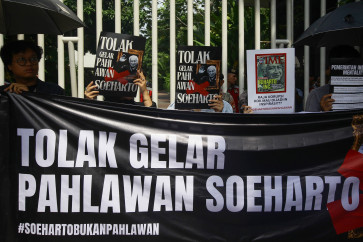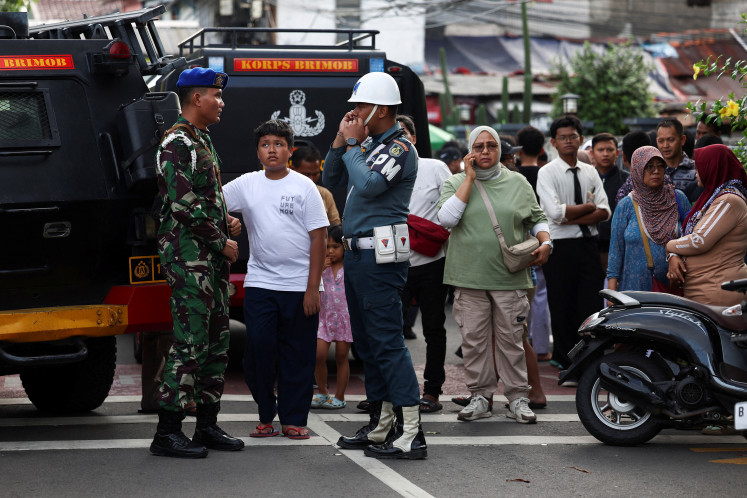Popular Reads
Top Results
Can't find what you're looking for?
View all search resultsPopular Reads
Top Results
Can't find what you're looking for?
View all search resultsUrban parents eye pop-up classes for children
Raising children in a city where concrete buildings grow faster than trees, parents need to be creative in finding places for their children to learn and play
Change text size
Gift Premium Articles
to Anyone
R
aising children in a city where concrete buildings grow faster than trees, parents need to be creative in finding places for their children to learn and play.
Those who have the resources can select one of the many classes provided by private child education centers. But for many other parents, their options are limited to entertainment or facilities in public spaces.
Although his daughter is still only 20 months old, Bimo Dwi Satrio has enrolled her in classes that aim to develop her sensory and motor skills. He said he did not mind the amount of money he spent on such classes, as he believes that education is an investment.
“At first my wife and I just wanted to optimize her growth during the golden age [0-5 years old],” the Kebayoran Baru, South Jakarta, resident told The Jakarta Post on Wednesday.
“After collecting some information, we realized that there are numerous locations and providers. Now, she is enrolled in Rumah Dandelion where she is involved in classes to stimulate her senses through music, art, crafts and much more,” he added.
Rumah Dandelion is located in Cilandak, South Jakarta. As well as routine classes for infants aged up to 3 years, it also offers pop-up classes, workshop and training.
The pop-up classes, which are held with certain topics or concepts, are addressed not only at children but also their parents. The cost of each class varies, starting from Rp 150,000 (US$10.6) per person.
There are a number of private playground providers that also offer programs for children.
There is, for example, Buumi Playscape at Pacific Place shopping mall in South Jakarta, which provides a paid-for play area for children, as well as classes.
The classes vary; starting from a class for infants aged six to 12 months old to develop their sensory and gross motor skills to a class for toddlers aged up to 4 years old to train their balance and some basic basketball skills.
Buumi Playscape only serves as the space provider for the classes, which are held by child education providers like Sunny Glow Montessori, Lil’ Hoopsters and Kekoci.
A more established venue is children’s edutainment center KidZania, located in the same mall, which charges Rp 50,000 to Rp 275,000 per child depending on the age and day in the week.
Unlike Bimo or other parents who have the extra funds to splurge on their children’s education and entertainment, Nurhayani and her son are satisfied with facilities in public places that are free of charge.
“If I had extra money, I would enroll my son in a mathematics course to help him with his math homework from school. I forget how to do most of the questions, I no longer can teach him by myself,” the Kebon Jeruk, West Jakarta, resident said.
Meanwhile, to pass their spare time, Yani prefers using public playgrounds such as integrated child-friendly public spaces (RPTRAs) or children’s playgrounds in the corner of fast food restaurants.
The RPTRAs were one of former Jakarta governor Basuki Tjahaja Purnama’s signature programs. During his term, the city opened hundreds of RPTRAs, aiming to make sure that every subdistrict in Jakarta had at least one RPTRA.
There are now 292 RPTRAs across the capital surpassing the number of subdistricts throughout the capital, which is 267.
Some RPTRAs are well-managed, RPTRA Tamplas Bambu in Cipayung, East Jakarta, for example. As seen in pictures posted on its Twitter account, the RPTRA organizers use the space to hold traditional dance classes, badminton courses, urban gardening and Quran recitals for children.
The current Jakarta administration said in January it had allocated Rp 40.4 billion from the city budget to develop 16 new public parks, which under the current Jakarta Governor Anies Baswedan have been called Taman Maju Bersama (TMBs).
Earlier this year, Anies announced that he expected to build 53 TMBs this year alone. He aims to have 200 TMBs by 2020 with a total of 500,000 trees and 1.5 million decorative plants.
Unlike RPTRAs that are specifically aimed at providing more child-friendly spaces, TMBs will serve other purposes like increasing the amount of green open spaces and to reduce air pollution.










